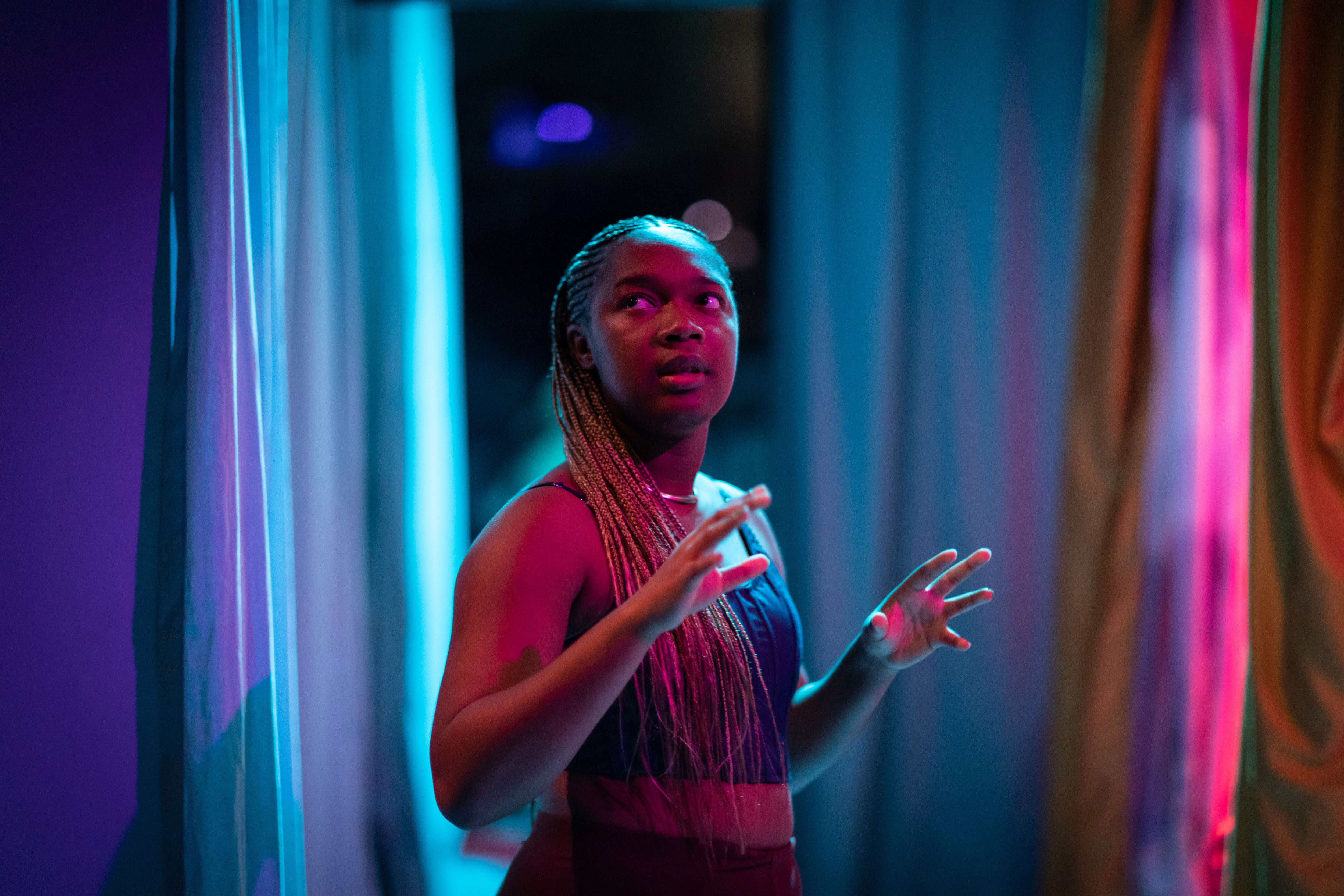Jasmine Lee-Jones: ‘People tend to commodify young women playwrights’
The acclaimed writer of ‘seven methods of killing kylie jenner’ returns to the London stage with a new play about her search for Black actors in 17th-century England. She talks to Isobel Lewis about the void in our historical imagination, the pressure of performing a very personal work and why theatre is not a meritocracy


Your support helps us to tell the story
From reproductive rights to climate change to Big Tech, The Independent is on the ground when the story is developing. Whether it's investigating the financials of Elon Musk's pro-Trump PAC or producing our latest documentary, 'The A Word', which shines a light on the American women fighting for reproductive rights, we know how important it is to parse out the facts from the messaging.
At such a critical moment in US history, we need reporters on the ground. Your donation allows us to keep sending journalists to speak to both sides of the story.
The Independent is trusted by Americans across the entire political spectrum. And unlike many other quality news outlets, we choose not to lock Americans out of our reporting and analysis with paywalls. We believe quality journalism should be available to everyone, paid for by those who can afford it.
Your support makes all the difference.The night before beginning rehearsals for her new play curious, actor and playwright Jasmine Lee-Jones wrote down two sentences. The first read: “I can’t do this.” The second? “I need to do this.” With her first play, seven methods of killing kylie jenner, earning rave reviews and winning awards, the 22-year-old knew that depicting this raw, emotional narrative on stage would be draining. But she was driven forward by a need to tell her story and show a missing side of history.
A one-woman show coming to Soho Theatre this month, curious centres around Jaz, a Black queer actor from London searching for her identity in today’s society and within Black British history. This manifests itself in a quest to discover the history of Black female actors working in this country during the Restoration period. Where artists are often keen to distance themselves from the version they portray on stage or screen, Lee-Jones has no problem admitting that curious is “basically about me”. She stars in the show and plays every part, from her friends to these historical figures. Naturally, it’s been an intense process and she sips on honey and lemon as we talk in the Soho Theatre bar. She seems unafraid of silences, pausing to consider and truly think about her words throughout our conversation. Rehearsals have been challenging, she tells me, and have found her confronting past troubles again.
The vulnerability required of at-least-semi-autobiographical work, paired with her Evening Standard and Critics’ Circle Most Promising Playwright awards, means that curious comes with an immense pressure she’s not been used to before. But she’s in a fortunate position, she says, and hyper-aware of the “minute privileges” that have been awarded to her – even without being a “white cisgendered male older person”. In what way? “People tend to commodify young women playwrights, I think I’ve been on the receiving end of some of it,” she says. “In honesty, I think there’s times where I’ve been given certain opportunities and I’m not saying I don’t deserve it, but I’m like, ‘I know another person that could do this who’s older than me and less shiny at the moment.’ And that I’ve really had to reckon with and be like, when do I pass this to someone else and when am I like, ‘No I can do this.’”
While Lee-Jones never performed in seven methods, curious was a show that could only ever be performed by her. It was born as a final-year project while she was studying acting at Guildhall School of Music and Drama in 2018, but she says she always knew “it had another life”. seven methods of killing kylie jenner, her debut play about cultural appropriation and social media, was staged first, initially running at the Royal Court in 2019 (it will be available to stream on their website in November). Throughout its success, she still found herself being drawn to that old story again. “I could have very easily just shelved it and left it at drama school. That nearly happened for a while and it just didn’t leave me and I had an enduring sensation that now is when I need to be doing [this],” she says. “[It’s] hard, I feel so seen and exposed, but at the same time, [there’s] the sensation of necessity and need and [Jaz’s] story powers me through that.”
Curious specifically draws from Lee-Jones’s experience at drama school, where she was one of two Black people in her year. It was a difficult experience in general, she says, but she particularly found herself “butting up against” the classical areas of study and being asked to perform within a historical period that “I didn’t even know someone like me existed in”. The gap in British history of Black stories, both in education and beyond, led to her feeling “severe isolation”.
One of the play’s first scenes sees Jaz struggling with a Restoration dance class, an area Lee-Jones always hated. “It’s a solid can’t-relate on so many levels,” she tells the audience. “I mean it just feels like a massive waste of time because these plays weren’t written with people like me in mind.” Even revisiting those feelings in rehearsal has been hard, Lee-Jones says. “I always just felt like a fish out of water at drama school… and in honesty, I’m having to confront that in rehearsal again. Just feeling like I’m so scared of being wrong or doing it wrong… At drama school we actually called it the little f***er, that thing in my head. I’m really having to grapple with for the whole performance.”
So in order to better understand this time period, Lee-Jones immersed herself in research, armed with one key question: was it even possible that a Black actor was working in the UK pre-Ira Aldridge, who was performing in the 19th century, more than 150 years after the Restoration? Throughout our conversation, Lee-Jones repeatedly uses the term “epigenetic memory” – the idea that memories can be inherited. There was an innate sense, an urgency, that such a woman had to exist.
“You don’t only look for something when you know it’s there, you look for something when you feel it’s there,” she says. But she found herself being held back up by the “lack of historical imagination” of others. She’d read Staying Power, Peter Fryer’s seminal history of Black Britons, which contained accounts of Black female actors auditioning and even playing Juliet in this period. But historians she contacted told her she was wrong – that there simply were no Black people acting in the mid-late 17th century. You can do all the work to bridge the gaps and widen the curriculum now, Lee-Jones says, but unless we acknowledge the “void” in our knowledge left by the slave trade, there will always be limitations. In curious, that search comes alive, in the most exciting, dramatic way.

For Lee-Jones, drama school was only the start of the problem, a microcosm of a theatre industry she’s never really seen herself represented in. “I always thought this at drama school – if I was in a room of other Black women, I wouldn’t be the odd one out,” she says, adding that she’s “never been in a room with just all Black women”. In curious, even the places Jaz is meant to feel part of, such as the Black queer nightlife scene of London, feel impenetrable. “I didn’t fit in... and had to perform an identity,” Lee-Jones says, “I think we actually do have to perform identities to survive sometimes.”
Theatre has sometimes felt like that too – albeit less so now. As the author of a critically adored debut play, Lee-Jones suddenly found herself within the “in-club” of a famously exclusionary industry. She’s previously said that theatre is not a meritocracy – how does she feel about that now? She pauses, mulling over her answer. “I feel like if I were to be like, ‘Yeah, absolutely,’ people will be like, ‘That’s quite rich, because you left drama school, you got to have a play on and then start working full-time in theatre,’” she says. “There’s an element of luck in my journey. I’m not saying I haven’t worked for it. Meritocracy, it’s such a loaded word. But it’s definitely not. Talking to my peers, when you’re in, you’re in, when you’re not, you’re not. Having been on the receiving end, I’m like, ‘Oh, I’m interesting now.’”
But even from within, Lee-Jones has noticed differences in ways she’s treated compared to other “promising” young playwrights. Off the back of seven methods of killing kylie jenner, she received theatre commissions from the Royal Court and Headlong, but points out that other up-and-coming artists have received many more. “I think if [seven methods] was a story that people recognise more widely and not about two young Black women... then that might have been different,” she says. “I’m suddenly reckoning with how much privilege I had and how much I really didn’t.”
With Lee-Jones having been heralded as a bright light in the industry, the hype around curious is massive. But no matter how big the audience, or how vulnerable she is on that stage, Lee-Jones is trusting in the sanctity of theatre. “There’s this rule... that no one will ever break, which is no one will interrupt a live performance,” she says. “When people do, it’s still shocking. As much as I hate rules, that rule is so special, because it allows a privacy and an intimacy of being listened to and it’s very therapeutic. What I’m hoping is, in having the safety of that rule, the safety of the blanket, I am protected in that story.”
‘curious’ runs at Soho Theatre until 16 October



Join our commenting forum
Join thought-provoking conversations, follow other Independent readers and see their replies
Comments